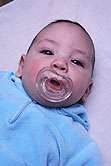Want tots without allergies? Try sucking on their pacifiers

(HealthDay)—A new Swedish study suggests that parents who want to protect their infants from developing allergies should try a simple approach to introducing their children to the wide world of microbes: Just pop their pacifiers into their own mouths before giving them back to their babies.
Although that may sound disgusting or even risky to some, researchers found that the transfer of oral bacteria from adults to infants seems to help train the immune system to ignore germs that don't pose a threat.
"The immune system's purpose is to differentiate between harmless and harmful," said Dr. Ron Ferdman, a pediatric allergist at Children's Hospital Los Angeles. "If your immune system is not presented with enough microbes, it just defaults to doing harmful attacks against things that are not harmful, like food, cat dander or dust mites."
A report released last week from the U.S. National Center for Health Statistics showed that the number of American children with allergies has increased dramatically in recent years: about 13 percent have skin allergies and 17 percent have respiratory allergies.
The Swedish researchers set out to learn whether very early microbial exposure during the first months of life affects allergy development. They found that children whose parents sucked on their pacifiers to clean them were less likely to have asthma, eczema and sensitivity to allergens than children whose parents did not clean the pacifiers this way.
The authors concluded that parental sucking of their baby's pacifiers may help decrease the risk of allergy caused by transfer of microbes through the parent's saliva.
For the study, published online May 6 in the journal Pediatrics, 206 pregnant women in Sweden were initially recruited as participants, and 187 of their infants were included in the research. The scientists sought families with at least one allergic parent to see if they could identify a different immune response in the children.
The researchers studied the transfer of microbes in the parents' saliva by fingerprinting bacterial DNA in 33 infants' saliva, of which 21 had parents who sucked on their pacifiers.
A total of 187 babies were followed until the child was 18 months old, and 174 were followed until they were 36 months old. The researchers chose to evaluate the children at those specific points in time because some diseases, such as eczema, develop early in life, said Dr. Bill Hesselmar, an associate professor at Queen Silvia Children's Hospital, in Gothenberg, Sweden.
Introducing solid foods into an infant's diet did not seem to affect the study results, Hesselmar said. "We found differences in the oral microbial flora already at 4 months of age, at an age when most children are still on breast milk."
Ferdman, who was not associated with the research, urged caution in interpreting the results of the study. "It's a small number of babies studied, so it's hard to generalize," he said.
He also expressed concern that results may not be widely applicable because the data were taken solely from Swedish participants, who are not a genetically diverse population.
Other researchers have expressed concern about dirty pacifiers.
Dr. Tom Glass, a professor of forensic sciences, pathology and dental medicine at Oklahoma State University, presented research at the American Society for Clinical Pathology in Boston last November that found a wide range of disease-causing bacteria, fungus and mold on children's pacifiers. They also found that pacifiers can grow a slimy coating of bacteria called a biofilm that alters the normal bacteria in the children's mouths, spurring inflammation and potentially increasing the risk of developing gastrointestinal problems or even ear infections.
The value of using a parent's saliva to clean a dirty pacifier has been known for some time, Glass said. "We have for a long time advocated that if you're at the Walmart and the baby drops the pacifier, you're better off putting the pacifier in your mouth [to clean it] because you have immunoglobulin components that fight bacteria in your saliva."
Glass expressed concern that the researchers did not identify the specific microbes transferred from parents to the pacifiers. "We don't know what the parents are actually transmitting to the child," he said.
What should parents do to help prevent allergies in their children? "Babies need to be exposed to the world, and exposure to the normal microbial environment is protective," Ferdman said. "Breast-feed for at least four to six weeks if you can. Don't smoke, and don't expose your children to secondhand smoke."
More information: Find out more about the risks and benefits of pacifiers from the American Academy of Family Physicians.
Health News
Copyright © 2013
















